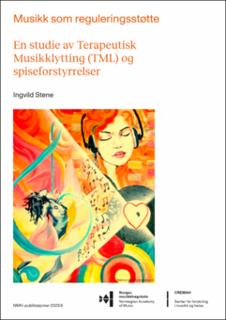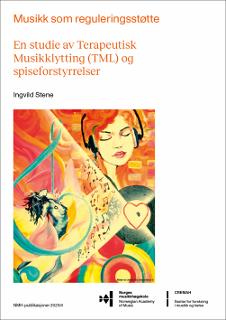| dc.contributor.author | Stene, Ingvild | |
| dc.date.accessioned | 2023-10-20T12:04:07Z | |
| dc.date.available | 2023-10-20T12:04:07Z | |
| dc.date.issued | 2023 | |
| dc.identifier.isbn | 978-82-7853-326-0 (pdf) | |
| dc.identifier.isbn | 978-82-7853-325-3 (trykt) | |
| dc.identifier.issn | 0333-3760 | |
| dc.identifier.issn | 2535-373X (online-utgave) | |
| dc.identifier.uri | https://hdl.handle.net/11250/3097816 | |
| dc.description | Avhandling (Ph.D.) - Norges musikkhøgskole, Oslo 2023 - Dissertation for the PhD degree Norwegian Academy of Music, Oslo 2023 | en_US |
| dc.description.abstract | Sammendrag - Musikk berører oss på mange ulike måter. Vi hører stadig flere fortellinger om hvordan musikk påvirker emosjonelle aspekter i menneskers hverdag. Foreliggende doktorgradsarbeid fokuserer på musikk som reguleringsstøtte i møte med emosjonelle utfordringer. Informantene i studien er 8 kvinner i alderen 20–50 år med spiseforstyrrelser. Emosjonelle utfordringer og manglende språk for følelser kan både være en årsak til og en konsekvens av spiseforstyrrelser. Studien ser på hvordan etablerte spiseforstyrrelsesstrategier kan påvirkes og endres til mer hensiktsmessige strategier for følelsesregulering.
Studiens kliniske tilnærming, Terapeutisk Musikklytting (TML) utforsker hvordan musikklytting kan innvirke på komponentene i emosjonell regulering. Studien viser hvordan reguleringsstøttestrategier i møte med fysiologiske mekanismer og følelser kan påvirkes og utvikles gjennom musikklytting. En viktig målsetting med studien har vært å undersøke hvordan TML kan bidra som terapeutisk tilnærming i arbeidet med å fornemme, gjenkjenne, tåle, bevisstgjøre og uttrykke følelser, samt utvikle nye strategier for følelsesregulering. Studien foregår i en gruppeterapeutisk kontekst hvor musikklytting benyttes på ulike måter for å fremme emosjonell kontakt og affektbevissthet. Den kliniske metoden (TML) bidrar til å forstå musikkens påvirkning på kropp og følelser, og hvordan musikk kan benyttes som reguleringsstøtte. I tillegg er et viktig aspekt i TML å stimulere til bevissthet om musikk som taktikk i hverdagslivet. TML er en psykoterapeutisk metode med teorigrunnlag fra eksistensiell psykoterapi, utviklingspsykologi og traumeforskning.
Tilnærmingen er sterkt influert av teori om musikk og identitet, Guided Imagery and Music (GIM) og elementer fra psykodrama. Musikkopplevelsen er sentral for å gjenkjenne og uttrykke mellommenneskelige forhold og reaksjonsmønster. Videre er det fokus på bevisstgjøring og refleksjon omkring følelser knyttet til disse opplevelsene. Som forsker har jeg lagt fenomenologiske prinsipper til grunn i forskningsprosessen. Men min forforståelse fra kunnskap og erfaring innebærer en hermeneutisk tolkning av empirien. Dette fordi musikkopplevelser er en del av en kontekst og samsvarer med en økologisk musikkforståelse.
Avhandlingen består av 9 kapitler. I innledningen beskrives studiens formål og forskningsspørsmål. Her presenteres også den kliniske tilnærmingen som danner et fundament i avhandlingen. Kapittel 2 gjør rede for litteratursøk og tidligere forskning. I kapittel 3 presenteres teori om spiseforstyrrelser, musikkforståelse, affektbevissthet og musikkens rolle og funksjon i emosjonell regulering. I kapittel 4 beskrives den praktiske gjennomføringen av studiens kliniske og kvalitative forskningstilnærming. Studien benytter datainnsamlingsmetoder bestående av kvalitative intervju, narrativ, deltagende observasjon og e-postutveksling. Det er informantenes musikkopplevelser og hvordan de beskriver musikk som reguleringsstøtte som står i sentrum. Kapittelet avrundes med forskningsetiske vurderinger. Kapittel 5–8 presenterer studiens resultater som omhandler musikalske ressurser, emosjonell regulering, affektbevissthet og overføring til hverdagen. Hvert resultatkapittel inneholder en diskusjonsdel i henhold til avhandlingens forskningsspørsmål, teorigrunnlag og metode. Kapittel 9 består av en oppsummerende diskusjon og konklusjon av studiens resultater og begrensninger. Det vil også bli pekt på hvordan den kliniske tilnærmingen kan videreutvikles.
Resultatene i studien, basert på informantenes erfaringer, viser at TML er egnet til å arbeide med affektbevissthet, og at de opplever økt emosjonell tåleevne ved bruk av musikk som taktikk. Studien viser også hvordan musikklytting kan ha en relasjonell og regulerende funksjon som bidrar til nye opplevelser og handlingsmuligheter, og reguleringsstøtte ved emosjonelle utfordringer i hverdagen. | en_US |
| dc.description.abstract | English summary -
Music affects us in numerous ways. We often come across stories of how music affects emotions in people’s everyday life. The main focus of the doctoral dissertation is an investigation of how music may serve as a means to support emotion regulation, when people are facing emotional challenges. The participants in the study are 8 adult women (20–50 years) sharing a lived experience of eating disorder. Emotional challenges and difficulties expressing emotions verbally can both be a potential causative factor and a consequence of living with an eating disorder. The present study investigates how established eating disorder behaviors/strategies can be influenced and changed into more adaptive and health promoting strategies/behaviors.The study’s clinical approach, Therapeutic Music Listening (TML), explores how music listening can influence different aspects of the individual’s emotion regulation. The study explores how supportive emotional regulatory strategies together with physiological mechanisms and emotions can be influenced and further developed through music listening. An important aim has been to investigate how TML can serve as a therapeutic approach in facilitating emotional experience, recognition, tolerance, awareness, and expression, together with developing new strategies for emotional regulation.The study was situated within a group therapy setting, where music listening was utilized in different ways to promote emotional awareness and stimulate affect awareness. The clinical approach (TML) contributes with an understanding of how music influences both body and mind, and how music can be utilized as a regulatory support. Also, an important aspect in TML is to stimulate the participants to utilize music more strategically in their daily life. TML is a psychotherapeutic method and has historical roots in existential psychotherapy, developmental psychology, and the trauma field. The method is influenced by theories on music and identity, Guided Imagery and Music (GIM) and elements from psychodrama, concerning theory, philosophy, as well as interventions/methods. The music experience is of central importance for the recognition and expression of interpersonal relationships. Together with this, emotional awareness and the ability to reflect on emotions is emphasized.As a researcher I have utilized principles from phenomenology throughout the research process. But my pre-understanding and experience involves a hermeneutic interpretation of data. This, because the experience of music is part of a wider context and resonates with an ecological understanding of music.
The dissertation consists of 9 chapters. First, the aim of the study and the research questions are described. In the first chapter, the clinical approach is also presented. Chapter 2 presents the results of the literature search, and relevant research is outlined. Chapter 3 considers theories on eating disorders, perspectives on music, affects and the role and function of music in emotional regulation. In chapter 4, the study’s research method is described. This qualitative study utilizes data collection methods consisting of qualitative interview, narratives, participatory observations, and exchanges via e-mail. The participants’ experiences and how they describe music as regulatory support is the main focus.I utilize qualitative research strategies. The data set consists of semi-structured interviews, observations-in-action [participatory observation] and correspondences via e-mail. Throughout, the participants’ music experiences is the main focus together with how they describe the processes when music is used as regulatory support. Ending the chapter, I consider ethical aspects concerning the current research. Chapter 5–8 presents the dissertations’ results which concerns musical resources, emotional regulation, affect awareness, and transfer to everyday life. Each result chapter discussed separately the empirical material and results within the context of the dissertation’s research question, theory and methods. Chapter 9 consists of a summary discussion and conclusion of results and limitations of the study. This chapter also includes reflections on possible further developments.
The results, based on the participants’ experiences, demonstrate that TML is feasible in working with affect awareness, and that the participants may experience enhanced tolerance for emotions while utilizing music as a tactic in forming new regulatory strategies. The study show how music listening can serve a relational and emotional regulatory purpose, contributing to new experiences and actions opportunities while facing emotional challenges in everyday life. | en_US |
| dc.language.iso | nob | en_US |
| dc.publisher | Norges musikkhøgskole ; Senter for forskning i musikk og helse (CREMAH) | en_US |
| dc.relation.ispartofseries | NMH-publikasjoner;2023:6 | |
| dc.subject | musikkterapi | en_US |
| dc.subject | musikkterapigruppe | en_US |
| dc.subject | gruppeterapi | en_US |
| dc.subject | spiseforstyrrelser | en_US |
| dc.subject | følelsesbevissthet | en_US |
| dc.subject | emosjonelle utfordringer | en_US |
| dc.subject | Terapeutisk Musikklytting (TML) | en_US |
| dc.subject | musikklytting | en_US |
| dc.title | Musikk som reguleringsstøtte. En studie av Terapeutisk Musikklytting (TML) og spiseforstyrrelser | en_US |
| dc.type | Doctoral thesis | en_US |
| dc.description.version | publishedVersion | en_US |
| dc.subject.nsi | VDP::Humaniora: 000::Musikkvitenskap: 110::Musikkterapi: 113 | en_US |
| dc.source.pagenumber | xv, 339 sider | en_US |

